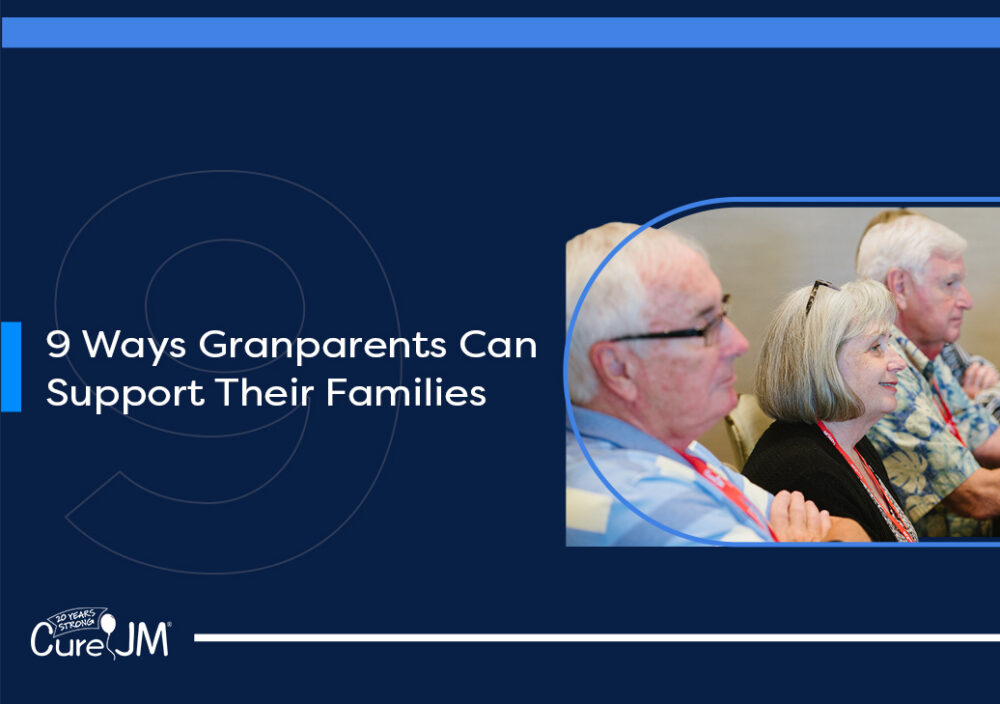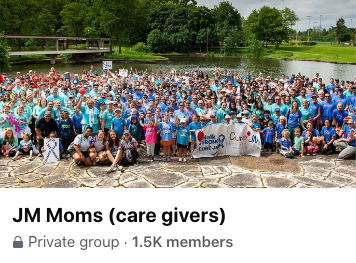We understand how difficult it is when your grandchild is diagnosed with juvenile myositis. We have compiled these tips from other JM grandparents on how to best support a grandchild, their siblings, and the family.
- Learn as much as you can about juvenile myositis. Becoming familiar with the disease is most beneficial at any stage, but the more you learn after diagnosis, the better. Since juvenile myositis is quite rare, your grandchild’s doctor may or may not have the most current information you need. Cure JM provides families with a lot of valuable resources. Learn more at www.curejm.org. We recommend reading our Impact Report at www.curejm.org/impact and the book “Myositis and You” at www.curejm.org/book.
- Listen and be present. Perhaps the greatest service a grandparent can offer is to listen when your children or grandchildren want to talk. Many grandparents have found that listening without giving unsolicited advice is a deeply appreciated gift. Often, your children may not have people in their lives with whom they want to discuss what their family is going through. Parents often have to be strong for their child(ren). Offering an ear and a safe place to vent can be an invaluable way grandparents can help.
- Ask the parents how you can help. It sounds simple, but many parents have difficulty asking for help. Offering to help can be a great way to provide support, whether you are nearby or separated by distance.
- Check in on your grandchild. With the parents’ permission, plan a time to stop by and visit or virtually check in on the computer, by phone or by sending a card or letter. Ask your child about their day and how they are doing. Remember that children may not always want to talk about their condition. They may want to be a normal kid! If they have a treatment coming up, mark the date on your calendar and check in with them on that day to show your support.
- Plan a special “fun” time with your grandchild. Being diagnosed with juvenile myositis can be stressful and scary for a child. Sometimes, a kid needs to be a kid. Maybe offer to play a game with them. Call the grandchild and tell them a joke if you are far away. Start a tradition of sending them a funny sticker or card weekly. If they are older, perhaps you can play chess with each other by phone or read the same book and discuss it. There are many ways to have fun with your grandchild, whether they live nearby or far away, but help them take a break from all the talk about doctors and medicine and allow them to have fun!
- Spend special time with the siblings. With juvenile myositis, the first year can be difficult until families get used to their “new normal.” Grandparents can be very helpful by providing extra attention and support to siblings. Many siblings report feeling anxious, worried, and nervous about what is happening with a new diagnosis in their family. Siblings may not want to “add to the parent’s stress” by talking about this with their parents. Grandparents can be a great place for siblings to discuss these feelings and to feel supported. One wise grandparent offered the tip to remember that if you bring a small gift or card to your grandchild with juvenile myositis, please remember the sibling(s), too.
- Offer to give the parents time together. The responsibility of being the parent of a child with a rare disease can be overwhelming at times. What you, the grandparent, can do to help may vary based on geographic location, job constraints, physical restrictions, financial issues, and other factors. Some grandparents can provide temporary relief by taking their grandchild for a few hours or a few days; some grandparents may be able to care for the sibling(s) or to take all the children to give mom and dad a chance to be alone with each other. When your grandchild with Juvenile Myositis is in your care, the guidelines established by his or her parents must be followed. You must ensure that the parents know in advance about any activities you plan to do with the grandchild—outside or inside. For all activities, proper sun and germ protection are needed, as well as any other precautions the parents would like. In addition, keep in mind the grandchild may tire more easily or need more rest time; these are important things to be aware of while the child is in your care. When caring for your grandchild, you may need to give medication at a specific time of day on a full or empty stomach. The schedules and procedures parents have established for the child should ALWAYS be followed. Structure and continuity of care are critical to your grandchild’s health and well-being.
- Financial assistance. Some grandparents can help financially, and having a child with a rare disease can create financial challenges for some families. Grandparents have offered to help lessen these burdens by paying a medical bill, contributing towards the cost of medication, or purchasing other needs such as sunblock, hats, or UV protective clothing. We advise asking the parents how your financial support could benefit their family’s circumstances. Other grandparents have paid for meal delivery, babysitters, or house cleaners to help ease the parent’s burden. It is very important to check with the parents before arranging these types of support to ensure you are providing the help that is most needed and helpful. Providing financial assistance under state and federal laws is also very important. Setting up a savings account in your child or grandchild’s name may later prevent that child from receiving vital financial assistance from the state, insurance company, or hospital where they receive their care. Depending on how you gift funds to the child or grandchild, there could be tax implications. Once the parents have consulted with a qualified financial advisor and their hospital, insurance company and other providers, they can let you know how your assistance can best be applied and in what way they would like you to contribute. Some grandparents have found it helpful to contribute directly toward a hospital or medication bill for the family. Those bills can be quite a surprise with a new diagnosis. Likely, your child was not planning on those expenses, and some extra help is appreciated. Please confirm with your child before paying any bills to ensure your well-intentioned support has the desired impact.
- Become an advocate. Like many rare diseases, all funds raised for research come from families and friends. Grandparents have always been an important part of Cure JM. For ways to get involved, click here and contact Randy Putt at puttsr@yahoo.com.




